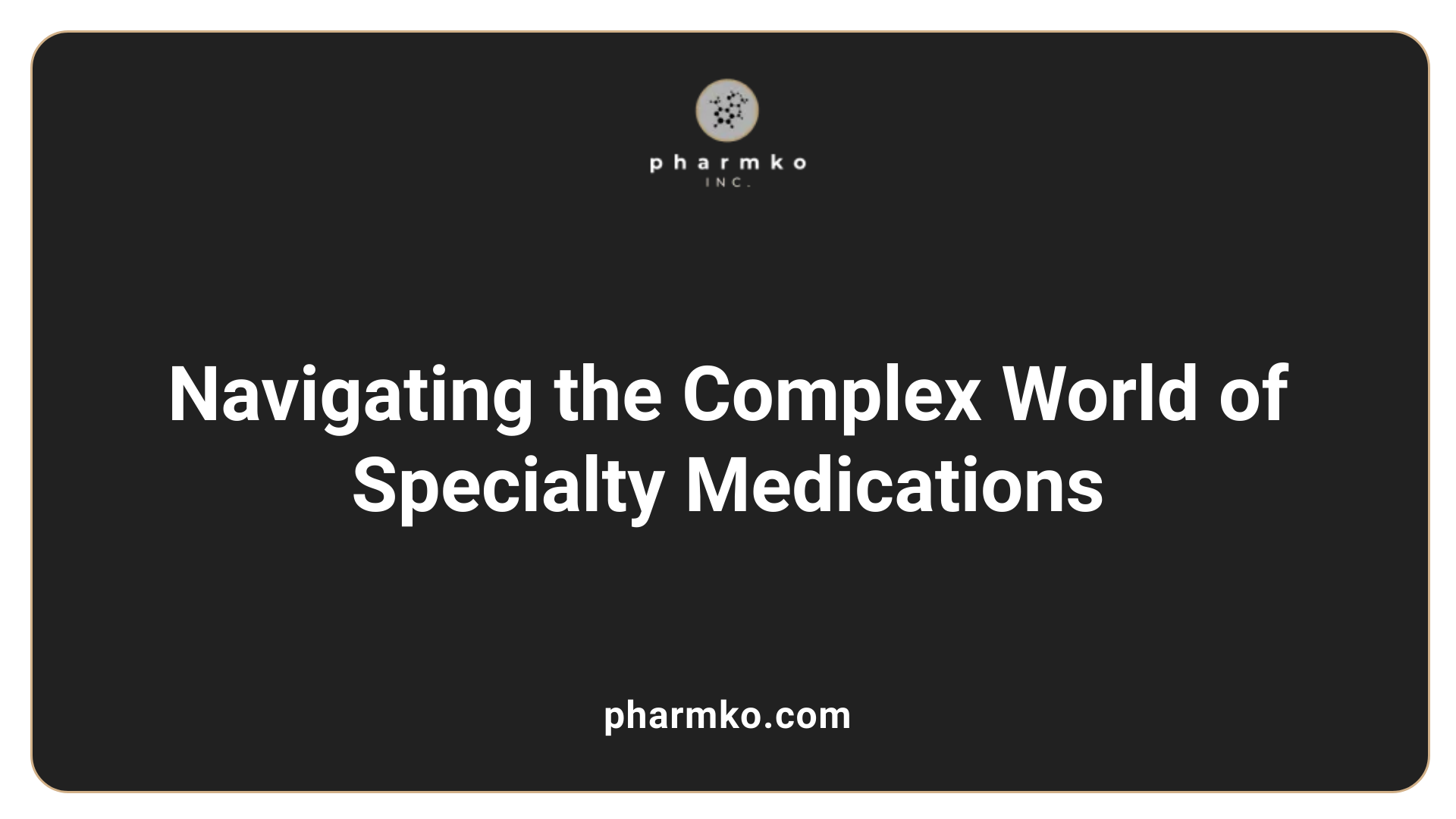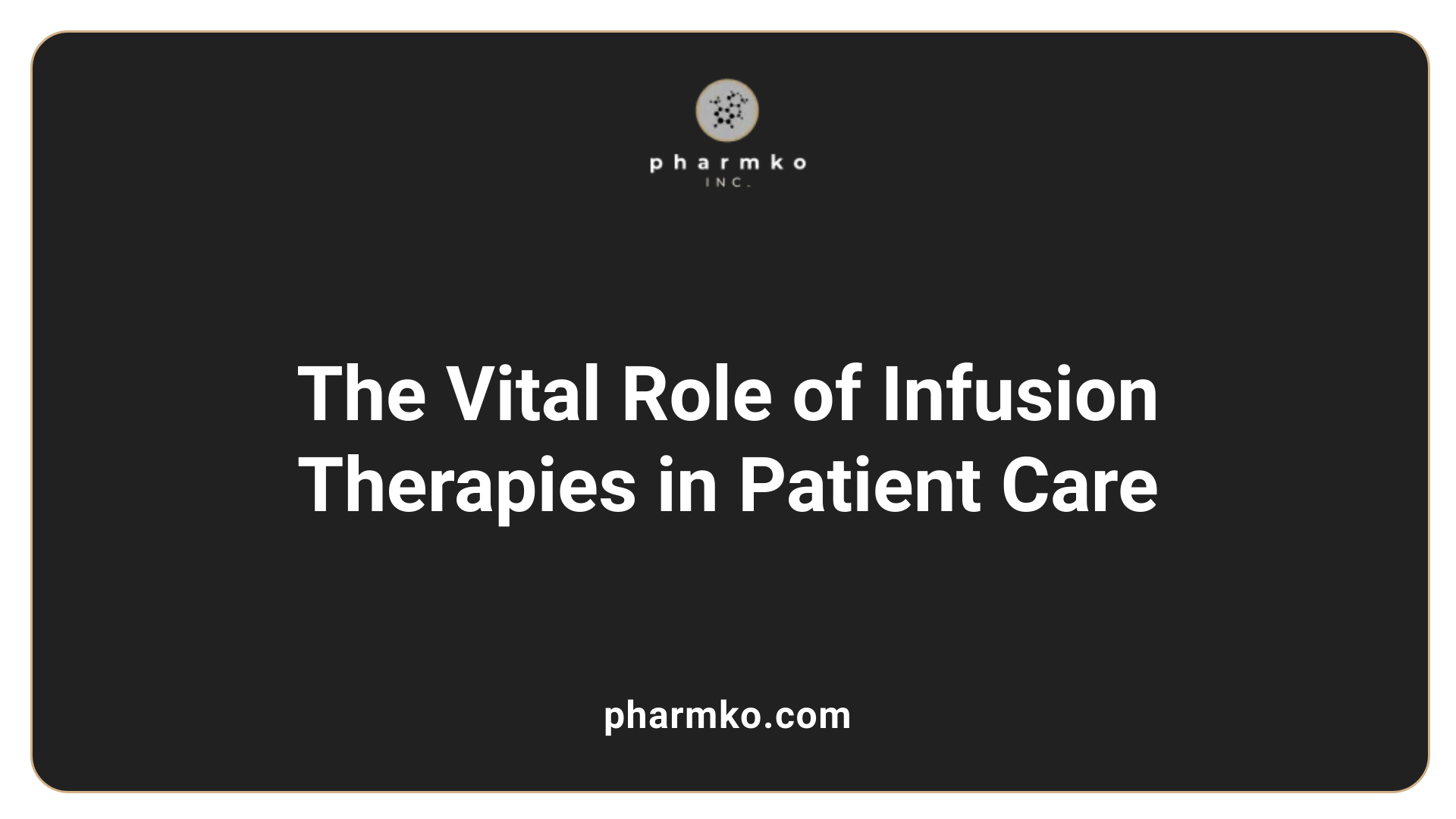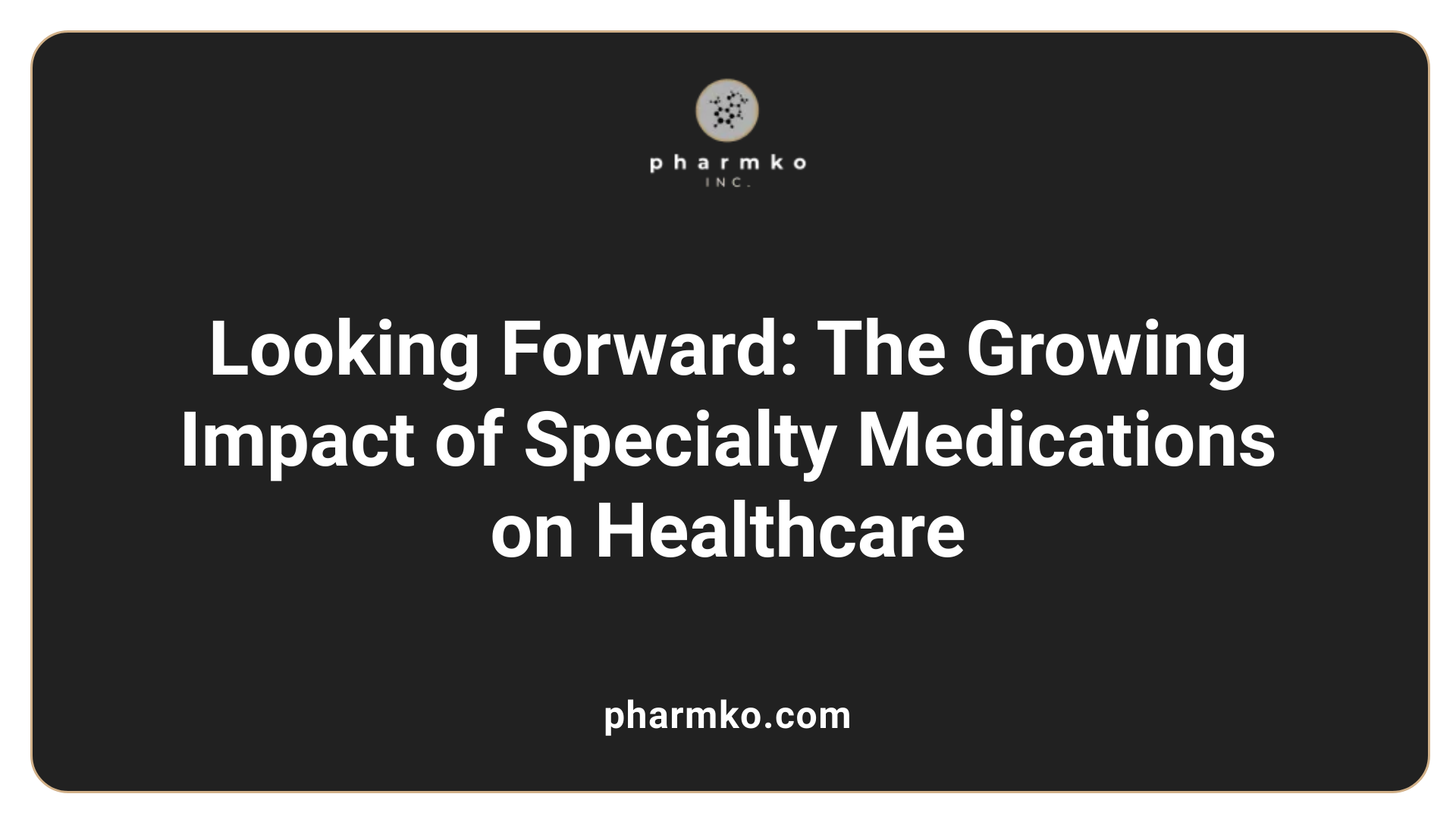Pharmko’s specialty medication options
Introduction to Specialty Medications Leadership
As the healthcare landscape becomes increasingly complex, the demand for specialized medications has grown exponentially. Pharmko emerges as a leader in this realm, offering tailored solutions that cater to the intricate needs of patients with rare and chronic conditions. This article delves into Pharmko’s unique specialty medication options, examining their applications, innovations, and how they stack up against other industry players.
Defining Specialty Medications

What is the difference between specialty and non-specialty medications?
Specialty medications specifically target rare or complex diseases and often involve unique handling and storage requirements. They typically need to be administered in specialized settings due to their inherent complexities. In contrast, non-specialty medications target more common health issues, including acute and chronic diseases, and are generally simpler to manage.
Specialty medications are generally higher in cost. They can exceed $1,000 per month, and their pricing often requires unique pharmacy benefit management considerations. This is important for insurance plans, as specialty drugs may drive a significant portion of overall healthcare spending despite representing a small percentage of prescription claims.
Characteristics of specialty medications
There are several notable characteristics that differentiate specialty medications:
- Cost : Specialty drugs often come with monthly costs above $1,000, significantly impacting insurance coverage.
- Handling and Administration : These medications usually have stringent storage and handling protocols, frequently requiring infusion or injection.
- Patient Population : They cater to complex needs, treating conditions like cancer, autoimmune disorders, and chronic infections, indicating that they are not generally prescribed to the wider population.
- Access and Coordination : Specialty pharmacies often handle coordination of care, ensuring patients navigate the reimbursement landscape effectively while receiving personalized treatment support.
| Characteristic | Specialty Medications | Non-specialty Medications |
|---|---|---|
| Cost | Generally > $1,000/month | Typically < $1,000/month |
| Administration Method | Requires special handling or injection/infusion | Oral or simple application |
| Disease Complexity | Treats complex and rare conditions | Common acute/chronic diseases |
| Pharmacy Services | Services tailored for reimbursement and care | Standard pharmacy services |
Understanding these distinctions is crucial for effective healthcare management and designing benefit plans that address patients’ specific needs.
Exploring Pharmko’s Specialty Offerings

PharmCo’s Specialty Medications for Chronic and Rare Conditions
PharmCo excels in providing specialty medications tailored to the needs of patients with complex and chronic conditions, including cancers, HIV/AIDS, and Hepatitis C. These medications are typically high cost and require specific handling, often involving injections or infusions.
The intricate nature of these specialty drugs makes them essential for treating conditions such as autoimmune disorders and rare diseases. For instance, therapies for conditions like Guillain-Barré syndrome benefit from these advanced formulations, enhancing both treatment efficacy and patient outcomes.
PharmCo's Reputation in Specialty Pharmacy Services
PharmCo has established a strong reputation within the specialty pharmacy sector, known for its ability to create custom compound medications using FDA-approved ingredients. They focus on personalized patient care through skilled pharmacists, ensuring that each patient receives tailored support based on their unique needs.
Specialty drugs can be financially burdensome, as they often cost over $1,000 per month. PharmCo aids patients by navigating complexities such as reimbursement and providing access to necessary medications.
What medications are considered specialty drugs?
Specialty drugs, or specialty pharmaceuticals, are high complexity and high touch medications used to treat complex or rare chronic conditions such as cancer, rheumatoid arthritis, and hepatitis C. These drugs are often biologics derived from living cells and can be injectable, infused, or sometimes oral, requiring unique handling and monitoring.
| Characteristics | Description | Examples |
|---|---|---|
| Cost | Typically priced at $670 or more per month | Cancer treatments |
| Complexity | High complexity requiring special handling | Rheumatoid arthritis medications |
| Usage | Treat complex or rare conditions | HIV/AIDS therapies |
Despite representing only about 1% of all prescriptions in the U.S., specialty medications accounted for one-third of drug spending in 2015, highlighting their significant financial impact on healthcare. Specialty pharmacies have been established to manage these medications effectively, ensuring that patients receive the necessary support and care.
Infusion Therapies and Compounding Specialties

Role of Infusion Therapies in Treating Chronic Diseases
Infusion therapies are essential for managing chronic diseases, especially when traditional methods, like oral medications, fall short. These treatments enable higher absorption rates, enhancing the effectiveness of the medication. Conditions like neuromyelitis optica spectrum disorder and Guillain-Barré syndrome rely on these approaches for effective symptom management. Medical specialties such as neurology, gastroenterology, rheumatology, and dermatology frequently incorporate infusion therapy into their treatment plans, underlining its broad applicability in chronic disease management.
Importance of Tailored Sterile Medications
Tailored sterile medications, achieved through compounding, are pivotal in personalized medicine. They allow healthcare providers to create custom dosages and formulations that cater to the unique needs of individual patients, including vulnerable populations like children and the elderly. This is particularly vital for patients requiring injections or intravenous treatments where contamination risks must be minimized. Furthermore, compounding pharmacists can exclude allergens from medications, ensuring that even sensitive patients have access to safe therapeutic options.
Innovations in Tailored and Compounded Medications

Benefits of tailored sterile medications for individual patient needs
Tailored sterile medications play a pivotal role in the advancement of personalized medicine. These specially formulated treatments are designed to meet the unique health requirements of individual patients, providing targeted outcomes that enhance the effectiveness of therapeutic interventions.
With sterile compounding, pharmacists ensure that medications are not only personalized in dosages but also maintain the highest standards of sterility, significantly lowering the risks of contamination and infection, especially for patients receiving injections or intravenous therapies.
Compounding services ensuring continuity of care
Compounding pharmacists are essential in managing the needs of diverse patient populations, including children and the elderly. They can create custom formulations that aid in adherence to treatment regimens while also allowing for allergy-friendly options. Patients can benefit from medications that exclude allergens, enhancing their overall safety.
Additionally, compounding pharmacies can recreate discontinued medications, ensuring ongoing access to vital treatments. This adaptability is crucial for patients needing specialty infusion therapies for chronic conditions, where traditional treatments may fail.
| Service | Benefit | Example |
|---|---|---|
| Tailored medications | Individualized treatment plans | Custom formulas for children |
| Allergy-friendly formulations | Safer options for sensitive patients | Medications without common allergens |
| Recreating discontinued meds | Continuity of care | Essential drugs brought back |
| Specialty infusion therapy | Enhanced efficacy for chronic conditions | Injectable treatments for autoimmune disorders |
Comparing Pharmko's Offerings to Other Specialty Pharmacies
How does Pharmko's offering of specialty treatments compare to other specialty pharmacies?
Pharmko excels in providing specialty treatments, particularly for conditions like hemophilia, utilizing a well-rounded patient-centered approach. One key aspect is their home infusion services, which prioritize patient comfort and accessibility in receiving necessary therapies. Unlike many external specialty pharmacies, Pharmko effectively manages complex medical needs by offering innovative treatments, including Hemlibra and gene therapies essential for hemophilia care.
The efficiency of Pharmko’s operations can be likened to that of integrated health system specialty pharmacies (HSSPs). Research shows that patients who utilize HSSPs typically experience significantly shorter wait times for their medications compared to those relying on external pharmacies. This streamlined process not only enhances the speed of treatment initiation but also reinforces the value of coordinated care among healthcare providers.
Overall, Pharmko's strategic positioning within the specialty pharmacy sector highlights their commitment to timely access to crucial therapies, improved patient outcomes, and enhanced adherence through tailored support systems. By emphasizing patient-centered care, Pharmko sets itself apart from many competitors, offering vital treatments in an accommodating manner, thus fostering a more supportive treatment experience for patients.
The Future of Specialty Medications in Healthcare

Growing importance of specialty medications
Specialty medications increasingly play a critical role in treating complex and chronic conditions, from rare diseases to prevalent illnesses. As we see a surge in the use of biologics and other innovative therapies, specialty medications account for a significant portion of healthcare costs. In fact, they represent around 50% of all drug expenditures, despite being used by only 2-4% of patients.
As a result, healthcare providers, payers, and patients must engage in a comprehensive approach to managing these medications. Understanding costs and treatment regimens is vital, especially as Medicare classifies specialty drugs based on monthly cost thresholds.
Role of specialty pharmacies in patient care
Specialty pharmacies, such as Accredo and Soleo Health, offer tailored support for patients on specialty medications. They not only provide unique fulfillment services but also facilitate drug access and manage reimbursement processes. This guidance is essential, especially in light of growing adherence issues; studies show that noncompliance with drug therapy leads to significant hospital admissions.
By coordinating care between prescribers and patients, specialty pharmacies improve outcomes and reduce costs. Their clinical teams are often organized by condition, allowing for personalized interventions and monitoring, which is key in managing side effects and ensuring effective administration of therapies.
| Topic | Details | Impact on Healthcare |
|---|---|---|
| Importance of Specialty Meds | Essential for chronic and rare conditions; significant cost portion | Rising healthcare expenditures; necessity for effective cost management |
| Specialty Pharmacies Role | Tailored support, drug access facilitation, patient education | Improved outcomes, reduced hospital admissions, enhanced care coordination |
Conclusion
Pharmko's extensive expertise in delivering specialty medications highlights the critical role these treatments play in modern medicine. By optimizing infusion therapies, compounded medications, and patient-centered service frameworks, Pharmko sets a benchmark for other specialty pharmacies. As the demand for highly specialized treatments continues to surge, Pharmko remains at the forefront, offering hope and improved outcomes for patients with life-altering conditions.
References
- Why choose tailored sterile medications? - Pharmko
- Specialty infusion for chronic diseases - Pharmko
- CVS Specialty Drug List
- Welcome to PharmCo Rx Pharmacy
- Pharmacy Benefits 101: Specialty Drugs | Capital Rx
- Specialty drugs in the United States - Wikipedia
- [PDF] ASHP Specialty Pharmacy Resource Guide
- How specialty pharmacies can make a difference - Accredo













